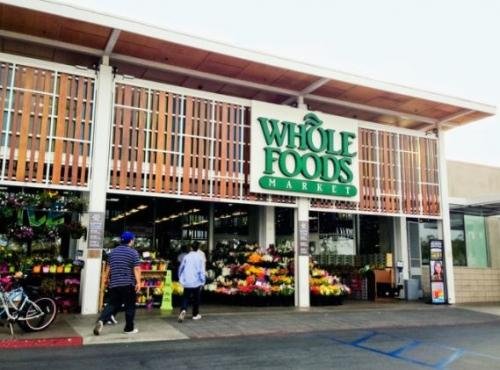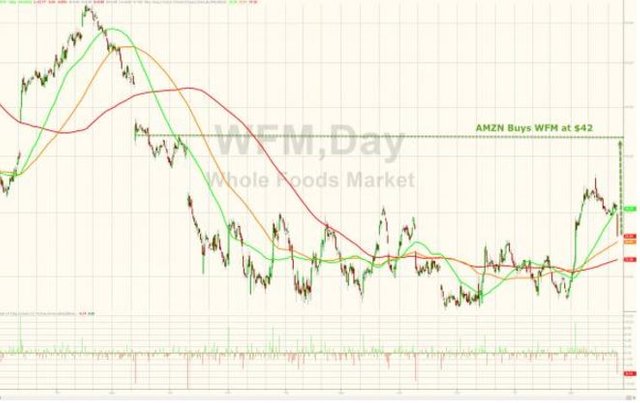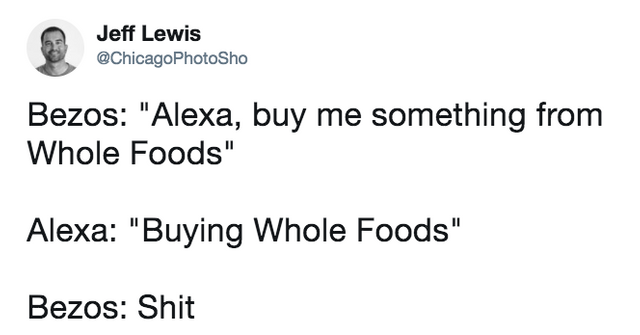With New Patent, Amazon Will Collect As Much Customer Data As Google
A day after Amazon announced it would jump head-long into the bricks-and-mortar grocery business by agreeing to buy Whole Foods Market for $13.4 billion, reports from earlier this week about a new patent issued to the company are starting to make more sense. The patent, which was first reported by the Verge, is for wireless technology that can effectively block customers in Whole Food’s retail locations from “showrooming." "Showrooming" is the practice of using retail locations to test out products before buying them online - a practice that Amazon, by making it easy to comparison shop on a smartphone, helped pioneer.
In its report, the Verge focuses on how the technology will help the company solve a problem that Amazon itself helped create – a problem that has plagued virtually every other traditional retailer.
"Systems and methods for controlling online shopping within a physical store or retailer location are provided. A wireless network connection may be provided to a consumer device at a retailer location on behalf of a retailer, and content requested by the consumer device via the wireless network connection may be identified. Based upon an evaluation of the identified content, a determination may be made that the consumer device is attempting to access information associated with a competitor of the retailer or an item offered for sale by the retailer. At least one control action may then be directed based upon the determination.”
But the technology described in the patent also raises serious concerns about the company’s plans for vastly expanding its capacity to collect and store customers' data. As MarketWatch’s Theresa Poletti reports, with this added capability, Amazon may soon be gathering as much data on its consumers now as Alphabet’s Google Inc.
Stephen DiFranco, an executive-in-residence at the Plug and Play Tech Center in Sunnyvale, Calif., offered a few disturbing hints about the scope of Amazon’s data-collection capabilities in an interview with MarketWatch.
“[The technology] will also triangulate your position in the store, market to you while you are in the store, and understand your behavior in the store,” said DiFranco, who previously worked at Broadcom’s Internet of Things business and led the sale to Cypress Semiconductor CY, -1.72% “If they can collect the same kind of info that they can get while I am surfing on their site, they are going to be able to deliver the same value, the same experience that I get on their site...The company that knows more about the online behavior of me, will now own this same science...while I am in the Whole Foods retail environment.”
The positive aspect, he said, is that it will result in better, more convenient shopping experiences for consumers, with their preferences and habits known. It has the ability to turn into a real assistant for shopping. “You passed the milk, you always get milk,” your smartphone may tell you while shopping.
DiFranco said that by combining the data Amazon already has about its current customers, plus far more frequent data that comes from grocery shopping, will turn it into an even bigger giant with vastly more data. “This is jet fuel in retail analytics that no one else will have.”
But while some customers might balk at the prospect of shopping in a store where literally every single action and preference is being recorded, investors don't seem to mind.
Whole Foods’ Market’s largest competitors lost a combined $32 billion in market capitalization yesterday after the announcement. Sell-side analysts have long been calling for a stronger management team to step in and take control of Whole Foods after years of chronically weak earnings and sluggish stock performance. Amazon’s stock also climbed 2.4% on the news, helping it slough off broader weakness in the FAAMG contingent.
Amazon, which already operates a grocery-delivery service in select markets, announced its plans for entering the bricks-and-mortar grocery business late last year when it opened its first small-format grocery store. At the time, the company said it could envision expanding to 2,000 stores. One of the store's most widely publicized features was its use of automation and AI technology to eliminate check-out lines and allow customers to freely walk out with their purchases. But following the latest revelation about Amazon’s big-data tactics, investors should hope the ecommerce giant also plans to address the more prosaic flaws plaguing Whole Food’s business: Namely, that, as stagnant wages and rising rents force consumers to cut back on spending, the “Whole Paycheck” image will likely continue to alienate shoppers.
Source : ZeroHedge
-------------------------------
For only the best of ZeroHedge and articles relating to Steem, Follow me @Zer0Hedge


The real reason for this transactions

Amazon is leader in online selling products
It have a share in internet industry
Its his right to collect data as a google to know what type of people want which things..
Quality is also considerable
As if it wasn't enough for them to collect a huge amount of data from their Echo devices
Spying on everyone 😊
Well Google gives the data to NSA . Jeff Bezos should have just asked google.
amazone is the best website
Sad reality